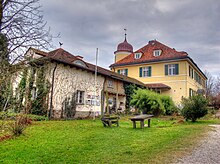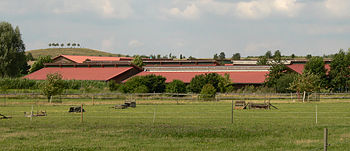Herrmannsdorfer Landwerkstätten
The Herrmannsdorfer Landwerkstätten are an ecological company founded in 1986 for arable and livestock farming as well as the production and marketing of fresh food . The name arises from the settlement on the former Herrmannsdorf estate , today a district of Glonn in Upper Bavaria . The company is a member of the Biokreis Association and works according to its guidelines.
aims


The founder, Karl Ludwig Schweisfurth , was dissatisfied with the production conditions in the meat and sausage manufacturer Herta-Wurst, which he inherited and managed . Critical questions from his children are said to have contributed to this. The company had "become too big for him to enable sensible ecological and quality supplies".
He therefore commissioned Frederic Vester's Biology and Environment Study Group to examine the company, the industry and its environment and to develop a corporate strategy. The study group designed a network of decentralized agricultural workshops that work in close cooperation with local farmers and take ecological relationships into account beyond the economic parameters. In particular, the aim was to abolish the enormous effort "that had pushed a wedge between producer and consumer through intermediate storage, intermediate cooling, preservation, packaging and transport and thus [...] reduced quality and increased operating costs without actually dealing with the product itself primarily to have something to do. "
A synthesis of agricultural production of plants and animals, food processing in the bakery , brewery , butcher's and cheese dairy and food marketing with its own shops was designed for the rural workshops . Essential factors were a catchment area of the workshops when purchasing from the farmer of 10 km and a distribution of the food within a radius of 25 km. The local raw material cycle should also apply to the producers. The production should use artisanal methods, further processing and sales should be so closely linked that conservation and interim storage are not required. In the workshops, direct contact between producers, craftsmen and customers should be possible, which enables the consumer to relate to natural food and the farmer to experience meaningful success. Last but not least, the workshops and their sales structures must be economically successful and show the conventional system that they are superior.
The implementation of these goals within Herta was not possible. That is why Schweisfurth sold the company in 1984, which had belonged to Nestlé since 1986 , and founded the first rural workshops in Herrmannsdorf in the Munich catchment area as a pilot project .
history
An old farm in Herrmannsdorf was taken over, restored and gradually expanded with the corresponding businesses.
In 2000, modern stables were built with sufficient space and a sophisticated energy cycle. The waste materials are automatically fed into the farm's own biogas plant.
Today the company, with more than 200 employees, is one of the largest employers in the municipality of Glonn, numerous farmers in the area can survive economically as suppliers, but are contractually bound by ecological principles. The managing director from 1996 to April 2018 was the founder's son, Karl Schweisfurth . Sophie Schweisfurth, granddaughter of the founder, has been managing director since May 1, 2018.
There is also the organic restaurant “Wirtshaus zum Herrmannsdorfer Schweinsbräu”, leased to Karl Kranawetter, Steirer Eck GmbH, since April 2018.
art
The artistic claim is realized through numerous works of art integrated into court life and the surrounding pasture areas. Regularly scheduled Hofmärkte always contain an artistic component of Jazz - sessions to art bazaar.
Subsidiaries

In addition to the main location in Glonn, another location was opened in Kerschlach (Upper Bavaria) in November 2006 .
For the world exhibition Expo 2000 in Hanover , a model village with the country workshops was opened near the exhibition grounds on Kronsberg . Although it was supposed to continue operating after the exhibition, this branch of the company soon had to file for bankruptcy. In 2004 the furnishings were auctioned.
Criticism and controversy
In 2016 there were allegations against Schweisfurth that his farms were using antibiotics and that pigs were kept in a critical way. Schweisfurth justified the use of antibiotics as necessary when alternative remedies failed. The use corresponds to strict guidelines. The earlier keeping of the mother sows in crate stalls was a result of the deliberations in which the protection of the piglets was in the foreground, which could not be crushed in this way.
Individual evidence
- ^ Herrmannsdorfer Landwerkstätten: The Herrmannsdorfer ÖQ control system
- ↑ a b c Frederic Vester: Metropolitan areas in crisis . dtv non-fiction book 1991, ISBN 3-423-11332-4 , pp. 127–129
- ↑ herrmannsdorfer.de: tavern
- ↑ Expo-Hof goes under the hammer. Press articles. (No longer available online.) February 24, 2004, archived from the original on October 7, 2006 ; accessed on August 27, 2020 (article appeared in HAZ ).
- ^ Christian Sebald: Munich: Herrmannsdorfer Landwerkstätten: Critique of animal husbandry . In: sueddeutsche.de . ISSN 0174-4917 ( sueddeutsche.de [accessed January 22, 2017]).
Web links
Coordinates: 47 ° 59 ′ 34.4 " N , 11 ° 53 ′ 54.4" E
